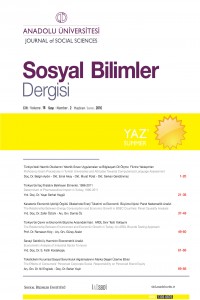Öz
The present study examines CSR in hotels. The study begins with a review of the concept of CSR in light of corporate sustainability, corporate reputation and corporate communications. It employs case study methodology to examine the CSR implementation and initiatives of the Accor Group which is one of the leading hotel operators in the world. The Accor Group is present in 92 countries across five continents, owns, leases or manages 3700 hotel properties. It has a portfolio of 18 brands ranging from economy to luxury. The reason Accor Group is selected for the case study is its CSR program titled “PLANET 21” which covers 21 CSR initiatives covering 7 domains which it calls; health, nature, carbon, innovation, local, employment and dialogue. These domains cover a wide spectrum of CSR topics and represent a variety of stakeholder groups. Also the global nature of the company under examination ensures that different types of geographically classified CSR philosophies are covered. The findings of the case study are used to develop suggestions for hotel businesses desiring to develop CSR policies.
Anahtar Kelimeler
Kaynakça
- ACCOR (2011a). Sustainable Hospitality. Access: http:// www.accorhotels-group.com/fileadmin/user_upload/ Contenus_Accor/Developpement_Durable/ img/PLANET_21/docs/EN/20110624_accor_sustainablehospitality_ readytocheckin_bd_en.pdf.
- ACCOR (2011b). Environmental Footprint Study. Access: http://www.accorhotels-group.com/fileadmin/ user_upload/Contenus_Accor/Developpement_ Durable/pdf/earth_guest_research/2011_12_08_ accor_empreinte_environnementale_dp_bd_ en.pdf.
- ACCOR (2012). The 7 pillars of PLANET 21. Access: http://www.accor.com/en/sustainable-development/ the-7-pillars-of-planet-21.html.
- ACCOR (2013). Business Review Accor 2013. Access: http://www.accorhotels-group.com/fileadmin/ user_upload/Contenus_Accor/Finance/PDF/2014/ UK/2013_business_review_accor.pdf.
- ACCOR (2014). Business Review. Access: http://www. accor.com/fileadmin/user_upload/Contenus_Accor/ Finance/PDF/2015/UK/plaquette_gb_accor_ groupe_2014.12.pdf.
- ACCOR (2015a). AccorHotels’ Strategic Vision. Access: http://www.accorhotels-group.com/en/group/ accorhotels-strategic-vision.html.
- ACCOR (2015b). Sustainable development. Access: http://www.accorhotels-group.com/en/sustainable- development.html.
- Bowen, H. R. (1953). Social Responsibilities of the Businessman. New York: Harper and Row.
- Carrol, A. B. & Shabana, K. M. (2010). The Business Case for Corporate Social Responsibility: A Review of Concepts, Research and Practice International Journal of Management Reviews, 12 (1), 85-105.
- Carrol, A. B. (1999). Corporate Social Responsibility Evolution of a Definitional Construct” Business & Society, 38 (3), 268-295.
- CSR EUROPE ( 2015). CSR History: 20 years of business-policy interaction driving the CSR movement. Access http://www.csreurope.org/history.
- Dahlsrud, A. (2008). How corporate social responsibility is defined: an analysis of 37 definitions Corporate Social Responsibility and Environmental Management, 15 (1), 1-13.
- GO GREEN (2013). Accor launches new sustainable development program - PLANET 21. Retrieved June 5, 2015, from http://www.go-green.ae/greenstory_view.php?storyid=2028.
- Göztaş, A. (2013). Halkla İlişkilerde Stratejik Uygulamalar. Özgür, A.Z. (Ed). Halkla İlişkiler Eskişehir: Anadolu Üniversitesi Yayınları, No: 2713.
- Hamarneh, I. (2013). Corporate Social Responsibility as a competitive advantage in Tourism sector. Journal of Tourism & Services, 4 (7), 36-51.
- Holcomb, J. L.; Upchurch, R. S. & Okumus, F. (2007). Corporate social responsibility: what are top hotel companies reporting? International Journal of Contemporary Hospitality Management, 19 (6), 461-475.
- Holme, L. & Watts, R. (2000). Corporate Social Responsibility: Making Good Business Sense. Conches-Geneva: The World Business Council for Sustainable Development.
- Lantos, G. P. (2001) The Boundaries of Strategic Corporate Social Responsibility. Journal of Consumer Marketing, 18 (7) 595-630.
- Öztürk, C. (Ed) (2013). Kurumsal Sosyal Sorumluluk Kavramı ve Gelişimi. Öztürk, C. (Ed) Kurumsal Sosyal Sorumluluk. Eskişehir: Anadolu Üniversitesi Yayınları, No: 3021.
- Pelit, E., Keleş, Y. & Çakır, M. (2009). Otel İşletmelerinde Sosyal Sorumluluk Uygulamalarının Belirlenmesine Yönelik Bir Araştırma, Yönetim ve Ekonomi, 16 (2), 19-30.
- Ryan, R. (2013). Accor waves the sustainability flag. Access http://www.hospitalitymagazine.com.au/accommodation/accor-waves-the-sustainability-flag.
- Smith, R. A. & Ong, J. L. T. (2015).Corporate Social Responsibility and the Operationalization Challenge for Global Tourism Organizations Asia Pacific Journal of Tourism Research, 20 (5), 487-499.
- Türker, N. & Uçar, M. (2013). Konaklama İşletmelerinin Sosyal Sorumlulukları. İşletme Araştırmaları Dergisi, 5 (3), 155-183.
Ayrıntılar
| Birincil Dil | İngilizce |
|---|---|
| Bölüm | Makaleler |
| Yazarlar | |
| Yayımlanma Tarihi | 12 Ağustos 2016 |
| Gönderilme Tarihi | 16 Mart 2016 |
| Yayımlandığı Sayı | Yıl 2016 Cilt: 16 Sayı: 2 |
Bu eser Creative Commons Atıf-GayriTicari 4.0 Uluslararası Lisansı ile lisanslanmıştır.


